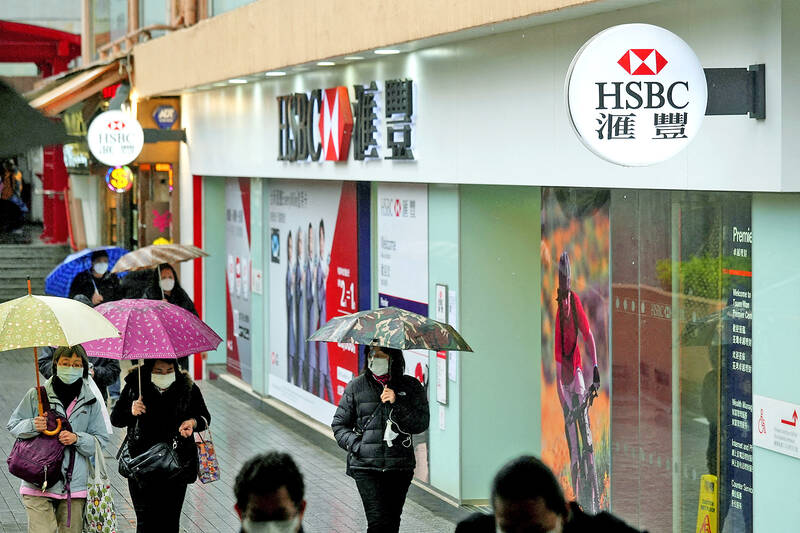HSBC Holdings PLC yesterday said pretax profit slipped more than 40 percent in the third quarter, citing an impairment on the planned disposal of its retail banking operations in France.
However, results were better than analyst estimates and were boosted by rising interest rates making lending more profitable.
The Asia-focused giant said pretax profit fell by US$2.3 billion to US$3.1 billion year-on-year, while net profit dropped 46 percent to US$1.91 billion.

Photo: Reuters
In a statement to the Hong Kong stock exchange, HSBC said it was looking to offload its French retail arm “as part of our actions to simplify our operations” in Europe, adding that it hoped the sale would go through in the second half of next year.
While reclassifying the French division, the bank “recognized an impairment of US$2.4 billion,” which affected the third-quarter figures, but adjusted pretax profit rose 18 percent to US$6.5 billion, beating analysts’ estimates.
The bank’s net interest income, which measures what it makes from lending minus interest paid on deposits and is a key measure of profitability, came in at US$8.6 billion, its best third quarter in more than eight years.
“Macroeconomic headwinds, including higher inflation and a weaker outlook, continue to weigh on the global economy,” HSBC said, adding that it had set aside more provisions against bad loans and had expected credit losses of US$1.1 billion for July to last month.
The bank specifically cited global uncertainty sparked by Russia’s invasion of Ukraine, the fall of the pound in Britain and the grim condition of China’s real-estate sector.
However, HSBC chief executive Noel Quinn said the bank was focused on delivering a returns target of at least 12 percent for next year, as well as keeping costs down.
“We retained a tight grip on costs, despite inflationary pressures, and remain on track to achieve our cost targets for 2022 and 2023,” he said in the earnings report.
HSBC is headquartered in London, but makes the vast majority of its profits in Asia, especially in China and Hong Kong.
Senior executives from the bank are expected to be in Hong Kong next week for a bankers’ summit that is being hosted by the territory, which only last month lifted mandatory quarantine for all international arrivals.
HSBC has vowed to accelerate a multi-year pivot to Asia and the Middle East, with ambitions to lead Asia’s wealth management market.
The bank said it would invest US$6 billion in Hong Kong, China and Singapore and hire more than 5,000 wealth advisers, while slashing 35,000 jobs and cutting less profitable operations in other markets, including France and the US.

Vincent Wei led fellow Singaporean farmers around an empty Malaysian plot, laying out plans for a greenhouse and rows of leafy vegetables. What he pitched was not just space for crops, but a lifeline for growers struggling to make ends meet in a city-state with high prices and little vacant land. The future agriculture hub is part of a joint special economic zone launched last year by the two neighbors, expected to cost US$123 million and produce 10,000 tonnes of fresh produce annually. It is attracting Singaporean farmers with promises of cheaper land, labor and energy just over the border.

US actor Matthew McConaughey has filed recordings of his image and voice with US patent authorities to protect them from unauthorized usage by artificial intelligence (AI) platforms, a representative said earlier this week. Several video clips and audio recordings were registered by the commercial arm of the Just Keep Livin’ Foundation, a non-profit created by the Oscar-winning actor and his wife, Camila, according to the US Patent and Trademark Office database. Many artists are increasingly concerned about the uncontrolled use of their image via generative AI since the rollout of ChatGPT and other AI-powered tools. Several US states have adopted

KEEPING UP: The acquisition of a cleanroom in Taiwan would enable Micron to increase production in a market where demand continues to outpace supply, a Micron official said Micron Technology Inc has signed a letter of intent to buy a fabrication site in Taiwan from Powerchip Semiconductor Manufacturing Corp (力積電) for US$1.8 billion to expand its production of memory chips. Micron would take control of the P5 site in Miaoli County’s Tongluo Township (銅鑼) and plans to ramp up DRAM production in phases after the transaction closes in the second quarter, the company said in a statement on Saturday. The acquisition includes an existing 12 inch fab cleanroom of 27,871m2 and would further position Micron to address growing global demand for memory solutions, the company said. Micron expects the transaction to

A proposed billionaires’ tax in California has ignited a political uproar in Silicon Valley, with tech titans threatening to leave the state while California Governor Gavin Newsom of the Democratic Party maneuvers to defeat a levy that he fears would lead to an exodus of wealth. A technology mecca, California has more billionaires than any other US state — a few hundred, by some estimates. About half its personal income tax revenue, a financial backbone in the nearly US$350 billion budget, comes from the top 1 percent of earners. A large healthcare union is attempting to place a proposal before